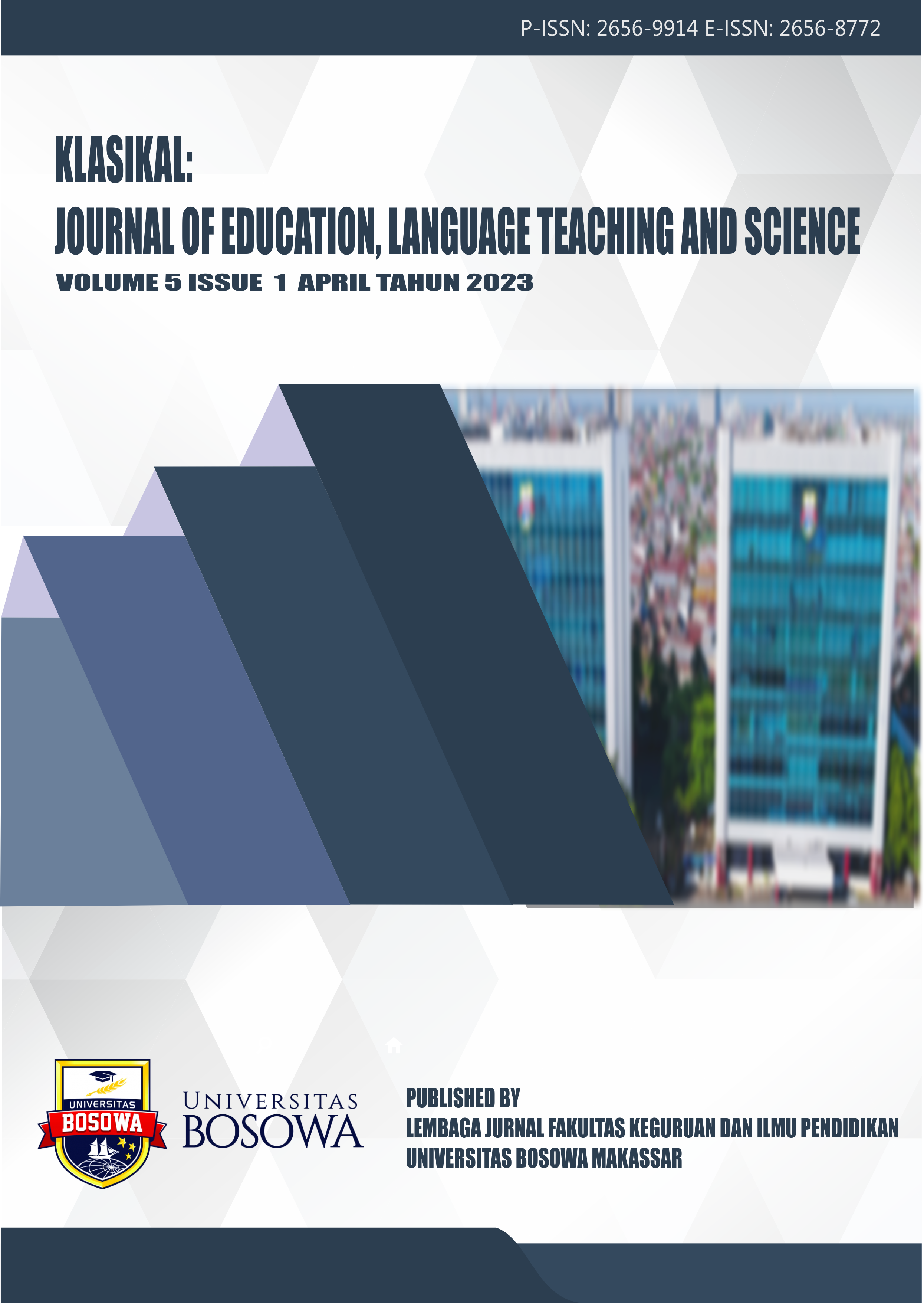NOVICE EFL TEACHERS’ PROFESSIONAL DEVELOPMENT: A NARRATIVE INQUIRY INTO MICRO-LEVEL DEVELOPMENT PROCESS
DOI:
https://doi.org/10.52208/klasikal.v5i1.613Keywords:
Novice EFL teacher, professional development, micro-level development process, features of changesAbstract
Educational researchers have made great strides in theorizing teacher professional development, though attention is still concentrated on isolated mental processes. This study therefore reports on a narrative inquiry aiming to find out micro-level development process that occurs in two novice EFL teachers and also to reveal the features of teacher’s change that appear to facilitate English language teaching and learning. A variety of data collection techniques including; narrative frame, field notes, semi-structured interview and stimulated recall interview are used to make teachers’ behavioral, attitudinal and intellectual component of micro-level development explicit. Two overarching themes that emerge in this narrative inquiry are; the route to be a good English teacher and rediscovering the passion to teach. The important key finding of this study is that the early year of teaching is sensitively crucial to EFL teachers’ micro-level development, which is characterized by a positive shift from constructive experiences and aspiration of better English language learning process to internalization of empathy, attentive and responsive manner. Another key finding of this study is that all the novice EFL teachers who spoke positively about implementing changes in their classroom practices, embraced most of the process of micro level development that occurred, based on intuition, without clear theoretical underpinning of pedagogy, and merely classroom-bound focus. However, this study contributes to the current knowledge in relation to the crucial role of three distinct patterns of PD; discontent, aspiration and without intention
References
Arizmendi Tejeda, S., Gillings de González, B. S., & López Martínez, C. L. d. J. (2016). How novice EFL teachers regulate their negative emotions. How, 23(1), 30-48.
Asi, D., Aydin, D., & Karabay, S. O. (2018). How preschool teachers handle problem situations: Discussing some indicators of emotional issues. Journal of the European Teacher Education Network, 13, 126-135.
Bandura, A. (1997). Selfefiicczcy: The exercise of control. New York: W. H. In. United States: Freeman.
Borg, S. (1997). Unifying concepts in the study of teachers’ cognitive structures. Unpublished manuscript.
Borg, S. (2003). Teacher cognition in language teaching: A review of research on what language teachers think, know, believe, and do. Language teaching, 36(2), 81-109.
Borg, S. (2006). Teacher cognition and language educationLondon: Continuum. New York: Continuum.
Evans, L. (1999). Managing to motivate: A Guide for School Leaders. London: Cassel.
Evans, L. (2014). Leadership for professional development and learning: enhancing our understanding of how teachers develop. Cambridge journal of education, 44(2), 179-198.
Evans, L. (2018). Implicit and informal professional development: what it ‘looks like’, how it occurs, and why we need to research it. Professional Development in Education, 1-14.
Evans, L. (2019). Implicit and informal professional development: what it ‘looks like’, how it occurs, and why we need to research it. Professional development in education, 45(1), 3-16.
Freeman, D., & Richards, J. C. (1993). Conceptions of teaching and the education of second language teachers. Tesol Quarterly, 27(2), 193-216.
Golombek, P. R., & Johnson, K. E. (2004). Narrative inquiry as a mediational space: examining emotional and cognitive dissonance in second‐language teachers' development. Teachers and teaching, 10(3), 307-327.
Harada, R. (2017). Effective strategies to enhance and maintain university english teacher motivation in japan. Journal of Pan-Pacific Association of Applied Linguistics, 21(1), 1-20.
Hoyle, E. (1975). Professionality, professionalism and control in teaching. London: Ward Lock Educational in association with Open University Press.
Huberman, M., & Miles, M. B. (2002). The qualitative researcher's companion. United States: Sage.
Liu, Y., & Xu, Y. (2011). Inclusion or exclusion?: A narrative inquiry of a language teacher’s identity experience in the ‘new work order’of competing pedagogies. Teaching and Teacher Education, 27(3), 589-597.
Öztürk, & Gürbüz, N. (2017). Re-defining language teacher cognition through a data-driven model: The case of three EFL teachers. Cogent education, 4(1), 1-20.
Sutton, R. E., Mudrey-Camino, R., & Knight, C. C. (2009). Teachers' emotion regulation and classroom management. Theory into practice, 48(2), 130-137.
Vonk, J. (1995). Conceptualizing Novice Teachers' Professional Development: A Base for Supervisory Interventions. San Franscisco.

Downloads
Published
How to Cite
Issue
Section
License
Copyright (c) 2023 Ikrar Ikrar, Sultan Baa

This work is licensed under a Creative Commons Attribution 4.0 International License.

Klasikal: Journal of Education, Language Teaching and Science is licensed under a Creative Commons Attribution 4.0 International License.



















